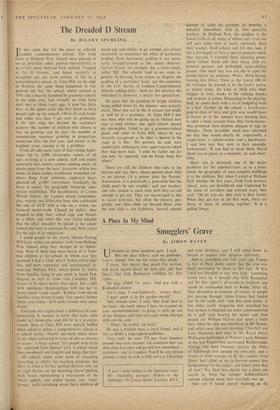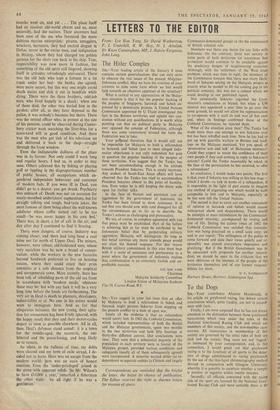A Place In My Mind
SMugglers' Grave
By SIMON RAVEN UPWARDS of three hundred quid,' I said.
'But, my dear fellow,' said my publisher, 'yoU're already into me for twice that much:.
'I know. But there's ,that novel I've written, and 'we've agreed about` the next one, and then there's that little Rumanian nibbling for film rights.
'He may nibble for .years. And pay, with a Rumanian cheque.'
'Art is long,' I said hopelessly : 'money short.' 'I don't grow it in the garden myself.'
'Any minute now,' I said, 'that kind Man at the bank - the bank where 1 have an account on your recommendation—is going to pick. up one of my cheques, and take out a pen newly charged with red ink,.and-----'
Don't,' he wailed, 'oh don't.'
He was a prudent man, a loyal friend, and (I like to think) a long-sighted publisher.
'Very well,' he said. 'I'll pay three hundred pounds into your account. On condition that you then close it at once and go and live somewhere-- anywhere- -out of London. You'll be sent fifteen pounds a week in cash, a little extra at Christmas
and your birthday, and I will come, down in person to inspect your progress quarterly.'
And so, something over tour Nears ago, I came to live in Deal, dimly aware that the area was Much patronised by those in like case, At first I had not intended to stay very long: something would 'turn up, I thought (the little Rumanian and the film right's?), all would be forgiven, one would be summoned back to Rome. After all, Deal abounded in evidence of transit, of people just passing through. Julius Caesar had landed just'by the yacht club '-andthen gone home. A few miles north Augustine had preached his first sermon in England (an event commemorated by a golf club bearing his name) and then passed on. William Hickey had spent a night here, when his ship was becalmed in the Downs, and sailed away the next morning. Churchill and Lady Hamilton had slept in the Royal Hotel, Wellington had lodged at Walmer Castle, Romans of the late Empireshad garrisoned Richborough, Vikings had been frequent visitors, the Duke of Edinburgh had opened the new pier, and a friend of mine anxious to fly the country from Dover had called on me to borrow money (not forthcoming) for his ticket: and where were they all now? No. Deal was clearly not a place one stayed in. Even the summer holidaymakers seemed relieved when their fortnight was up.
And yet, I found myself thinking as the months went on, and yet . . . The place itself had an insolent old-world charm and so, most assuredly, had the natives. Their ancestors had been men of the sea who favoured the more dubious marine enterprises: pirates, smugglers, wreckers, barrators, they had excited disgust in Defoe, terror in the excise men, and indignation in Hickey, whom they had charged ten golden
guineas for the short row back to his ship. True, respectability was now more in fashion, but something of the old spirit still lingered, showing itself in attitudes refreshingly anti-social. There.
was the old lady who kept a fortune in a tin trunk under her bed: the banks, she agreed, were more secure, but this way one might avoid death duties and dish it out in handfuls while dying. There were the three brothers, odd-job men, who lived happily in a shack: when one of them died, the other two buried him in the garden; after all, as they later deposed to the police, it was nobody's business but theirs. There was the retired officer who, in protest at the size of his pension, could be observed during Canter- bury cricket week searching the litter-bins for a score-card still in good condition. And there was the man who got sick of his television set and delivered it back to the shop—straight through the front window.
Even the indisputable dullness of the place was in its favour. Not only could I work long and regular hours, I had to, in order to stay sane. Others achieved this by fishing or playing golf or tippling in the disproportionate number of public houses, all occupations which en- gendered independent behaviour and contempt of modern fads. If you were ill in Deal, you didn't go to a doctor, you got drunk. Psychiatry was unheard of. Death was not an occasion for mealy-mouthed undertakers' euphemisms, but for straight talking and tough, bad-taste jokes, the most famous of them being about the well-known adulterer whose coffin turned out to be too small—'he was never happy in his own bed.' There was, in short, a lot of salt in the air, and day after day I continued to find it bracing. There were dangers, of course. Industry was coming closer, and there had long been a coal mine not far north of Upper Deal. The miners, however, were robust, old-fashioned men, whose very socialism was by now a brand of conser- vatism; while the workers in the new factories beyond Sandwich preferred to live on housing estates, where they could enjoy their prim amenities at a safe distance from the sceptical and unregenerate town. More recently, there has been talk of rebuilding parts of the old sea front in accordance with 'modern needs,' whatever those may be; but with any luck it will be a very long time before the funds are forthcoming. The very air in Deal is death to planners, developers, industrialists et al. No .one in his senses would want to immigrate here. And as for that ubiquitous nuisance, the new young, their agita- tion for amusement has been firmly ignored, with the happy result that they and their motor-cycles depart as soon as possible elsewhere. All in all, then, Deal's defences stand sound: it is a town for the middle-aged, the eccentric, the em- bittered and the peace-loving, and long likely so to remain.
So when, in the fullness of time, my debts were cleared and my term of exile served, I de- cided not to leave. Here was an escape from the modern world; here was an oasis of honest reaction. Even the 'under-privileged' joined in the game with apparent relish. `So Mr. Wilson's to have £14,000 a year,' remarked a fisherman the other night: 'be all right if he was a gentleman.'































 Previous page
Previous page